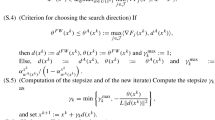Abstract
The formulations of problems of analysis and synthesis in multipolar communication networks with variable flow rates on the arcs of the network are considered. In contrast to traditional formulations, the concepts of flow density, flow rate, and flow intensity are introduced, and the temporal characteristics of the movement of the given volumes through the network are analyzed. Similar problems arise in various spheres of human activity, for example, when studying traffic flows in models of evacuation of large cities or in problems of planning and managing transportation in problems of urban logistics. Mathematical formulations and algorithms for solving problems of transportation in a multipole network with variable flow rates are presented, which, under certain conditions, make it possible to avoid solving complex nonlinear problems of mathematical programming of large dimensions.


Similar content being viewed by others
REFERENCES
E. G. Davydov, Games, Graphs, Resources (Radio Svyaz’, Moscow, 1981) [in Russian].
A. A. Mironov and V. I. Tsurkov, “Network models with fixed parameters on communication nodes. I,” Izv. Ross. Akad. Nauk, Tekh. Kibern., No. 4 (1993).
A. A. Mironov and V. I. Tsurkov, “Network models with fixed parameters on communication nodes. II,” Izv. Ross. Akad. Nauk, Tekh. Kibern., No. 6 (1993).
A. A. Mironov and V. I. Tsurkov, “Transportation problems with a minimax criterion,” Dokl. Akad. Nauk 346, 168–171 (1996).
A. A. Mironov and V. I. Tsurkov, “Hereditarily minimax matrices in models of transportation type,” J. Comput. Syst. Sci. Int. 37, 927 (1998).
A. A. Mironov and V. I. Tsurkov, “Minimax under nonlinear transportation constraints,” Dokl. Math. 64, 351 (2001).
A. A. Mironov and V. I. Tsurkov, “Open transportation models with a minimax criterion,” Dokl. Math. 64, 374 (2001).
A. A. Mironov, V. V. Fedorchuk, and V. I. Tsurkov, “Minimax in transportation models with integral constraints: II,” J. Comput. Syst. Sci. Int. 44, 732 (2005).
F. Haight, Mathematical Theories of Traffic Flow (Academic, New York, 1963).
O. A. Kosorukov, Network. Risks. Resources (Kazan. Gos. Univ., Kazan, 2006) [in Russian].
O. A. Kosorukov, “Optimization problems of transportation in communication networks with variable capacities,” J. Comput. Syst. Sci. Int. 55, 1010 (2016).
L. R. Ford, Jr. and D. R. Fulkerson, Flows in Networks (Princeton Univ. Press, NJ, 1962).
H. Frank and I. T. Frisch, Communication, Transmission, and Transportation Networks (Addision-Wesley, Reading, MA, 1971).
P. Jensen and W. J. Barnes, Network Flow Programming (Wiley, New York, 1980).
H. A. Taha, Operations Research: An Introduction, 10th ed. (Pearson Education, New York, 2017).
Author information
Authors and Affiliations
Corresponding authors
Rights and permissions
About this article
Cite this article
Kosorukov, O.A., Tsurkov, V.I. Problems of Minimizing Transportation Time in Networks with Variable Flow Intensity. J. Comput. Syst. Sci. Int. 60, 409–421 (2021). https://doi.org/10.1134/S1064230721030084
Received:
Revised:
Accepted:
Published:
Issue Date:
DOI: https://doi.org/10.1134/S1064230721030084




